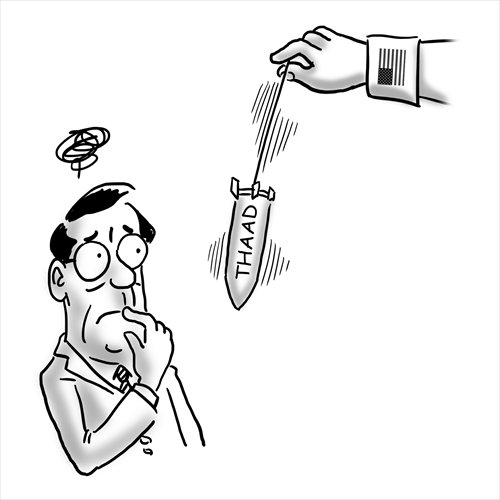HOME >> OP-ED
Beijing, Seoul must keep clear mind
Source:Global Times Published: 2016-2-16 18:43:01

Illustration: Shen Lan/GT
Chinese Executive Vice Minister of Foreign Affairs Zhang Yesui co-hosted the seventh China-ROK High-Level Strategic Dialogue between Foreign Ministers with Lim Sung-nam, South Korean First Vice Foreign Minister in Seoul on Tuesday. The talks came after North Korea's fourth nuclear test and a recent satellite launch. Divergences have emerged between China and South Korea regarding sanctions against the North and the deployment of the Terminal High-Altitude Area Defense (THAAD) system in South Korea. The Dialogue therefore has put the controversy over the THAAD deployment on agenda.The latest nuclear moves by Pyongyang have aggravated Seoul's sense of insecurity. South Korea's upset is understandable and we should sympathize. However, it should also take China's feelings into account as deploying THAAD will pose a threat to China's security. Chinese Foreign Minister Wang Yi said in a recent interview that the deployment of the THAAD system by the US is used to target China.
Pyongyang's reckless moves have cornered all parties. The US, further away, has more room for maneuver than China and South Korea. As neighbors of Pyongyang, both Beijing and Seoul have their own difficulties. Rather than importuning each other, they must cooperatively spare no efforts in controlling the crisis. This is key to solve the conundrum.
Public opinion in both the US and South Korea is claiming that China has the ability to control North Korea. This is a misperception. There has been growing anger toward Pyongyang within Chinese society. However, given China's own national interests over the Korean Peninsula issue, it's impossible for China to turn its border with the North into another DMZ, as on the 38th parallel.
The Chinese mainland will be included into the defense area of the THAAD system if it is deployed in South Korea. It smacks of the US anti-missile system in Eastern Europe which is meant to target Russia despite claims it defends against Iranian threats.
South Korea has its own difficulties, so does China. Both sides should avoid rashness. They shouldn't create new, and even bigger, troubles in order to solve the old ones.
Once the THAAD system is deployed in South Korea, Chinese society will be bound to support the People's Liberation Army to respond via a strong enough military deployment in northeast. If so, South Korea may turn into a highly sensitive area in the game of military deployments between China and the US. It will make the Blue House further lose its national independence, and become a pawn in the game between major powers.
Beijing and Seoul are friendly neighbors. In recent years, Pyongyang's stubborn insistence on nuclear tests has caused alienation between China and North Korea, while closer ties between China and South Korea are highlighted. Although next to Pyongyang, South Korea is the country that has done best in gaining advantage from each side and winning the most strategic resources in Northeast Asia. It should thus not sabotage this advantageous regional structure by deploying the THAAD system.
The Chinese public should be aware that in essence, the US has always been playing a part in the troubles between China and North and South Korea. The US is not interested in completely ending the cold war system on the Korean Peninsula, this is the root cause of all the problems.
After all, China is at the outside of the Korean Peninsula. Even though the US is far away, it has troops deployed there. Once a conflict or a war emerges, Washington's embroilment into it will be no less than China's. There is nothing for China to be afraid of.
Beijing should clearly draw a bottom line. Whoever crosses it will pay the price. China is strongly against any turmoil or war on the Korean Peninsula. But once it happens, we will not be scared to get involved.
With such determination, everything will be easier while facing the issues on the Korean Peninsula. There is no need for us to beg anyone. China should respect each side, and negotiate with them with rational reasons. And then, strength and acts will speak louder than words.
This is an editorial of the Chinese edition of the Global Times on Tuesday. opinion@globaltimes.com.cn
Posted in: Viewpoint